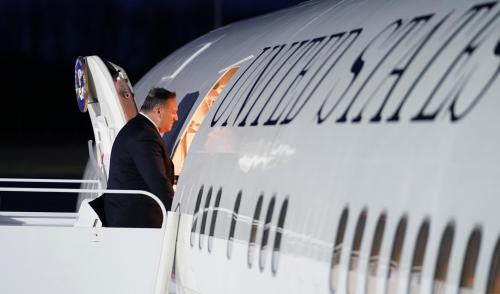African Union summit focuses on “silencing the guns”
This week, the African Union (AU) held its 33rd annual Heads of State and Government Summit in Addis Ababa, Ethiopia. This year’s theme, “Silencing the Guns: Creating Conducive Conditions for Africa’s Development,” refers to Aspiration 4 of Agenda 2063, “a peaceful and secure Africa.” Despite the AU’s hard-pressed efforts to address warfare and insecurity, violence persists in many regions. As UNECA Executive Security and Brookings Africa Growth Initiative Nonresident Senior Fellow Vera Songwe noted in her remarks, “Compared to 2005 when there were only six countries in active conflict on the continent and 7 armed conflicts, 15 years later and 10 years after the Union declared the need to silence the guns we have outperformed ourselves for the worse. The number of countries with armed conflicts has risen to 17. So, an over three-fold increase.”
Other issues on the leaders’ agenda included gender equality, climate change, and the African Continental Free Trade Agreement—all of which South African President Cyril Ramaphosa highlighted in his acceptance speech as he assumed the position of chair of the AU.
Also in attendance was Canadian Prime Minister Justin Trudeau, the 2020 chair of the United Nations Peacebuilding Commission, who met with several African heads of state to discuss future security trends in Africa, the AU’s role in peacekeeping, job creation for youth, and how the international financial institutions can contribute to long-term peacebuilding efforts. In their remarks, both Trudeau and African Development Bank President Akinwumi Adesina noted that a lack of shared prosperity is contributing to growing extremism and conflict.
Trudeau wasn’t the only Western leader to visit Africa recently. Last week, German Chancellor Angela Merkel visited South Africa to discuss trade relations. South Africa is Germany’s biggest trade partner in Africa; Germany is South Africa’s second-largest trade partner in the world. Given that South Africa is now chair of the African Union and Germany will soon assume the presidency of the European Union, a mutually beneficial partnership between Merkel and Ramaphosa could have benefits beyond just their respective countries. Merkel and Ramaphosa also discussed climate change and renewable energy: Currently, coal plants generate 89 percent of South Africa’s electricity while Germany plans to phase them out by 2038.
Kenyan President Kenyatta visits DC to talk trade, security with President Trump
Earlier this week, President Uhuru Kenyatta visited Washington, D.C. to meet with U.S. President Donald Trump to discuss a forthcoming trade agreement between their two countries. Annual trade between the U.S. and Kenya is valued at $1 billion, 70 percent of which is under the African Growth and Opportunity Act, which gives preferential treatment to certain goods from qualified African countries. Trade was not the only item on the agenda: The U.S. announced this week that Kenya will be the first country outside the United States to host the U.S.-funded Joint Terrorism Task Force. As part of the agreement, 42 select Kenyan investigators will receive intensive counterterrorism training at FBI headquarters in Quantico, Virginia.
Meanwhile, Secretary of State Mike Pompeo heads to Africa this weekend, with stops in Angola, Ethiopia, and Senegal. For more on the trip as well as recommendations for Pompeo from our experts, listen to AGI’s media briefing from earlier this week.
Ban on motorcycles in Lagos, Nigeria sparks protests
At the end of January, authorities from Nigeria’s business capital Lagos announced a ban on commercial motorcycles (known as okadas) and small three-wheeled vehicles (known as kekes), citing overcrowding and safety issues. The ban bars these vehicles—the most common form of public transportation in Lagos—from nearly all main commercial and residential neighborhoods.
Although some new buses were provided by the government to mitigate the effects of the ban, the number was not sufficient to transport all residents who previously relied on motorcycles. As a result, the first week of the ban, which went into effect at the beginning of February, resulted in widespread disruption, with long lines at bus stations and millions of residents left stranded. Residents—who are frustrated by the government’s decision to enact the ban without providing sufficient alternative means of transportation—and motorcycle drivers—whose livelihoods have been threatened by the ban—have both protested the decision. Delivery companies, who use motorcycles but were not included in the ban, have also complained about being mistakenly arrested by the police.





Commentary
Africa in the news: AU summit, Kenyatta meets with Trump, and Lagos bans motorcycles
February 15, 2020